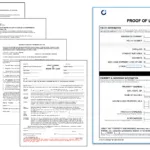Filing a homeowners or property insurance claim can be frustrating. Jumping into a claims process and dealing with insurance companies, adjusters, contractors, or attorneys immediately after your property is damaged can be a headache. Having your property damaged is already frustrating, and making an insurance claim and following it through to payment can be tedious. It’s not something you do every day, and it’s subject to nuanced and hard to understand state laws and regulations, as well as complicated policy terms. The good news, through, is that Nevada has strong policyholder protections built into the insurance law, and the insurance regulations provide strict deadlines and requirements for the investigation and payment of property insurance claims. If policyholders are aware of these deadlines and rules, and are proactive with respect to their claims, they should have a smooth, fast, efficient, and fair insurance claim process.
These resources are built to help policyholders — and all the stakeholders who work with them, like adjusters, attorneys, contractors, and consultants. These resources will help you file your claim correctly, document your losses thoroughly, and know when and how to followup through the claim process. And, if necessary, how and when to escalate and resolve the claim.
Claim Filing Deadline
Reasonable time
The timeline by which to make a property insurance claim in Nevada is set by the policy documents. However, it is always a good idea to make a claim as soon as reasonably possible given the circumstances. According to the Nevada Division of Insurance, a policyholder who wants to make a claim should immediately contact the insurance company after the property sustains damage, but wait until a police report number is established if the claim is related to theft.
Initial Response Time
20 working days
Once an insurer receives a notification of claim from their insured, the insurance company is required to acknowledge the claim within 20 working days and to provide the policyholder with all necessary claim forms, instructions, and assistance to help comply with the policy conditions and the insurer’s reasonable requirements within the same 20-working-day period.
Claim Decision Time
30 working days
Nevada requires that an insurer inform the policyholder of the acceptance or denial of the claim within 30 working days from receipt of a “properly executed” proof of loss from the claimant.
Lawsuit Deadline
1 Year
Nevada allows property insurance policies to contain language limiting the time to file suit to no less than 1 year from the date the of loss. Note, however, that this deadline is limited to contractual claims and not claims bad faith or unfair claims settlement practices.
State Department
Nevada Department of Insurance
Nevada Division of Insurance
3300 W. Sahara Ave., Suite 275
Las Vegas, NV 89102
(775) 687-0700
Nevada Division of Insurance websiter
Email: insinfo@doi.nv.gov
File your Claim Now with ClaimSpot
ClaimSpot guides you through a quick, secure, and effortless filing experience.
It’s free. Let ClaimSpot Make Your Claim Fast & Easy.
Nevada Insurance Claim Guide
Filing: Nevada Insurance Claim FAQs
All insurance claims start by informing your insurance company of the loss. You want to do this as soon as possible. There are many ways to notify the insurance company. It’s most important that you keep a record of notifying them. Here are frequently asked questions about how to best “file your claim” with the insurance company in Alabama and the state regulations that will help (or hurt) you!
In order to initiate a claim under a property insurance policy in Nevada, the policyholder must inform their insurance carrier of the loss (either directly or through their agent), and that they are making a claim. According to the Nevada Division of Insurance, a policyholder who wants to make a claim should immediately contact the insurance company after the property sustains damage, but wait until a police report number is established if the claim is related to theft.
In many cases, an insurance company will call this communication a first notice of loss, or FNOL. In Nevada, insurance laws call this communication a “notification of claim” or “receipt of claim”.
Most insurance companies provide multiple ways to contact them after a loss to begin the claims process, these usually include:
a. Phone call (a number is usually provided on the insurance company’s website);
b. Online portal – many insurance companies have an online form to notify the claims department of a loss;
c. Your agent (or “producer”) – many insurance companies even have a different section of their website or phone number for an agent to inform them of a policyholder’s loss;
d. Online software.
While it is easy and quick to start a claim, claimants need to continue to follow-up and provide more information. In many cases, the insurer will require more information and supporting documentation, including specific forms, to actually process and adjust the claim. In Nevada, any necessary forms must be provided to the claimant by the insurance company within 20 days of making the claim.
1. Promptly inform your insurance carrier of the loss (see above);
2. As soon as possible begin to mitigate the damage – protect the property and secure it against further damage as soon as it is safe and possible to do so.
3. Cooperate with your insurance company and communicate with them (and keep copies of all correspondence).
4. Make your property available for inspection as soon as it is safe and possible to do so.
5. Prepare supporting documents for your claim including:
– Inventory list;
– Description of damages;
– Photographs and/or videos of the damage;
– Receipts; etc.
Reporting Deadline: Nevada insurance law does not specifically set forth a universally applicable deadline for making a property insurance claim. This means that the deadline for informing the insurer of a claim is set by the policy itself. It is important to be familiar with the insurance policy so that deadlines are not missed. Most insurance policies require that a claim be made “immediately” after the loss, or “promptly” or within a “reasonable time.” Note, however, that according to the Nevada Division of Insurance, a policyholder who wants to make a claim should immediately contact the insurance company after the property sustains damage, but wait until a police report number is established if the claim is related to theft.
It is always best practice to inform an insurance company of the losses sustained and that a claim is being made as soon as it is reasonably possible to do so after the damage is incurred and a determination that a claim will be filed is made. While it is never a good idea to delay in providing the insurance company with information once it has been determined that a claim will be filed, the actual meaning of “immediate” or “prompt” or “reasonable” with respect to making a claim depends on the circumstances – if a home is completely destroyed by a storm and the phones, internet, and power are off, it may take a little longer to make the claim.
Be sure to check the language of the insurance policy to determine the notification or reporting deadlines. But, in any event, remember that best practice is to provide notice of the loss and claim to the insurer as soon as possible.
Followup: Document Your Nevada Insurance Claim FAQs
Notifying the insurance company about a loss is just the first step. The most important work comes next: documenting your loss and following up with the carrier. Nevada has enacted many regulations to guarantee that the insurance company acts moves quickly and fairly to investigate and pay your claim…but you need to understand these regulations and know the deadlines. That means communicating with the insurance company early and often and putting them on the clock. These FAQs will show you how.
Documentation Deadline: Nevada does not set a specific deadline to provide support for a claim by statute, but instead allows this timeline to be set by the policy itself. In many cases, Nevada insurance policies require that a proof of loss document be provided within 30 or 60 days of when the proof of loss was requested by the insurance company, but this is not a hard and fast rule. In any event, however, the deadline for submitting a proof of loss may be extended by agreement between the parties if circumstances make it difficult or impossible for the policyholder to comply with the deadline as set forth by the policy. Also note that, the insurance company is required to provide claim forms, (including any proof of loss document required) as well as instructions and assistance to the policyholder within 20 working days from receipt of notification of claim.
Note, however, that no matter the actual deadline for providing supporting documentation, it is always best practice to provide a proof of loss document and support of the claim as soon as possible (while noting that the document only presents the knowledge at the time and may be amended or updated). Some deadlines for Nevada insurance companies start to run from their receipt of a sufficient proof of loss, so getting one to the insurance company quickly is a good way to get the claim process moving along, and to get your payment.
Nevada has adopted laws governing unfair claims settlement practices to protect policyholders and to provide a streamlined timeline for claims to be handled, and these laws provide deadlines for the acknowledgment and investigation of claims.
Deadlines for Acknowledgment: Nevada requires insurance companies to acknowledge property insurance claims after they receive them so that the policyholder is aware that the claim has been received and in the hands of the insurer. Once an insurer receives a notification of claim from their insured, the insurance company is required to acknowledge the claim within 20 working days.
Further, Nevada law requires that the insurer provide the policyholder with all necessary claim forms, instructions, and assistance to help comply with the policy conditions and the insurer’s reasonable requirements within the same 20-working-day period.
Deadlines for Investigation: Nevada insurers are also generally required to begin and conclude any required investigation into the claim fairly quickly. After the insurer receives the notification of claim they must begin their investigation of the claim within 20 working days. Additionally, the insurer is required to “complete an investigation of each claim within 30 days after receiving notice of the claim, unless the investigation cannot reasonably be completed within that time.”
The insurer is also required to respond to any communication from the insured policyholder that reasonably indicates a response is expected within 20 working days of receipt of such communication.
Resolving: Get Paid & Protect Your Rights On Nevada Insurance Claim FAQs
Ultimately, the insurance claim must be approved and paid (or, unfortunately, denied). Getting to this step and getting the money has a lot of logistics…and that is if everything goes well. If all or any portion of the claim is debated (which is really common) then you need to escalate it. In either event, Alabama has regulations governing these timelines to guide the way. These FAQs show what is supposed to happen.
Deadline for Acceptance/Denial: Nevada requires that an insurer inform the policyholder of the acceptance or denial of the claim within 30 working days from receipt of a “properly executed” proof of loss from the claimant. This is one reason why it is important to not delay in providing a proof of loss document to the insurance company, the claim acceptance deadline is based on receipt of that document.
If the insurance company needs more time in order to determine whether the claim is to be accepted or denied, the company must notify the claimant within the original 30 working day period, and give the reason more time is needed. Additionally, if more time is needed after the initial notification, the insurance company must then also provide written communication stating why additional time is needed within 30 days from the date of such initial notification and again every 30 days thereafter while the investigation remains incomplete.
Deadline for Payment: Nevada insurance regulations state that the insurance company must pay the claim “within 30 days after it is accepted” and, “[i]f the accepted claim is not paid within that period, the insurer shall pay interest on the claim.
Nevada insurance law sets forth many specific acts that, if undertaken by an insurance company, constitute unfair practices in settling claims. If an insurance company is determined to be in violation of the unfair claims settlement practices requirements, the insurer is “liable to its insured for any damages sustained by the insured as a result of the commission of any” such act.
Additionally, the policyholder may file suit against the insurer for bad faith for an unreasonable denial of claim or payment of benefits. In order to be successful in such a suit, the policyholder must show:
(1) The insurer’s denial of a claim;
(2) The insurer had no reasonable basis for denying the claim; and
(3) The insurer knew or recklessly disregarded the fact that there was no reasonable basis for denying the claim.
If the policyholder is successful in a bad faith suit against the insurer, the policyholder may recover the amounts that should have been paid, attorneys’ fees, damages for emotional or mental distress, and in some cases punitive damages. Note that punitive damages, if appropriate, are not capped with respect to bad faith by an insurer.
Deadlines to File Suit: Nevada allows property insurance policies to contain language limiting the time to file suit to no less than 1 year from the date the of loss.
Note, however, that this deadline is limited to contractual claims pursuant to the insurance contract. Nevada courts have consistently held that claims against the insurer for bad faith or unfair claims settlement practices are not subject to the 1 year policy limitation.












